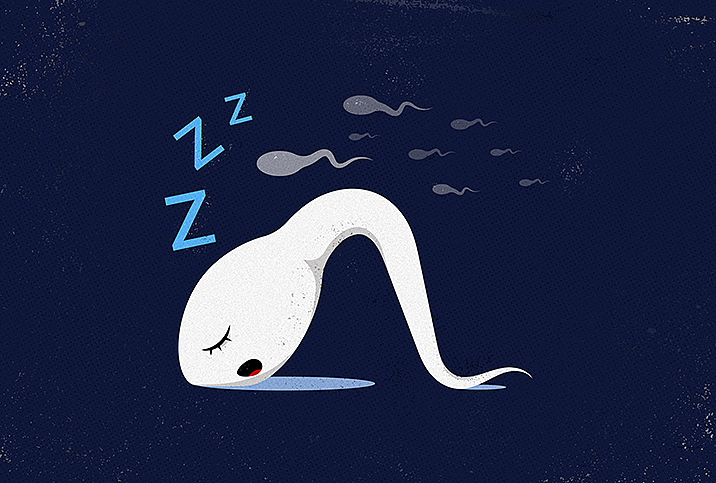5 Myths About Male Fertility

We humans are a storytelling species. And if there's one genre that's sparked our interest since the dawn of time, it's our stories of how babies are made.
From 17th-century scientists believing tiny preformed humans inhabited each sperm to Eastern European yarns of women being impregnated by snow to Navajo tales of a pair of women getting knocked up by water and a sunbeam, stories explaining how conception might work have always been imaginative.
We're not all that different today. Only these days, our legends and tall tales get passed down via dodgy internet sites.
Here are some of the most egregious myths about male fertility:
1. Male infertility is rare.
Around 9 percent of men of reproductive age have experienced fertility problems, compared with about 11 percent of women, according to the Centers for Disease Control and Prevention (CDC). In general, male reproductive issues are the cause in about one-third of infertility cases among heterosexual couples.
While honing in on a specific cause of infertility for any given couple can take some patience and not a small amount of research, studies show a varicocele is present about 40 percent of the time in men tested for fertility problems, according to the American Urological Association. Cause and effect are uncertain, however, because 8 out of 10 men who have a varicocele don't have fertility problems.
2. If your semen looks normal, everything's fine.
It's not clear where this particular myth came from unless it was just wishful thinking—or perhaps the desire of ancient, infertile kings to blame their queens for their lack of male heirs.
However, it's simply not true. Regardless of semen volume, color, thickness, odor or any other appearance-based factor, until you have a professional look at your sperm under a microscope, you just don't know how healthy it is.
Sperm makes up only about 3 percent of semen volume anyway, and you have to test for various fertility factors such as sperm count, motility and shape before you can rule out male factors in a couple's infertility.
3. The boxers vs. briefs brawl
Here's another hoary legend that refuses to die: You need to wear boxers, not briefs, if you want to have a child.
This one is at least rooted in reality if still false. To produce healthy sperm, the man's testicles need to be a few degrees cooler than the rest of the body. That's the whole point of the scrotum: to keep the balls away from the rest of the body.
However, despite a flurry of breathless news stories in 2018 suggesting a study published in the journal Human Reproduction showed lower sperm counts in men who wore briefs, many reporters left out the most salient point. The lower sperm count of brief-wearers was still well within the normal range, and it "probably doesn't make a lot of difference," according to the study's lead author, Dr. Jorge Chavarro.
4. Alcohol is the only beverage you should avoid if you're trying to conceive.
Numerous studies attempting to show a link between alcohol consumption and male infertility have had limited success, according to a 2020 study in the journal Human Reproduction. However, heavy alcohol use clearly harms sexual function and therefore has an indirect impact on fertility by lowering testosterone levels and reducing sperm quality.
On the other hand, research shows sweetened beverages can also have a real impact. A 2018 study published in the journal Epidemiology showed that intake of sugary beverages, such as soda and energy drinks, harmed the ability to conceive for men and women who consumed seven or more of the beverages per week. Diet sodas and fruit juice did not show similar results.
5. Sleep isn't a factor in fertility.
While a great deal of research has been done in recent years showing how important sleep is to mental health, fewer specifics are available when it comes to sleep-related physical issues.
One 2018 study published in the journal Fertility and Sterility found that men who got less than six hours of sleep per night showed a significantly lower ability to conceive. Indeed, they were 40 percent less likely to impregnate their partners than men who slept eight hours a night.
Conclusions
While there's still a lot we don't know about the precise way fertility works, we can make a few comments with relative certainty: Losing weight, exercising, sleeping well, eating a healthy diet, cutting down on alcohol and quitting smoking are all significant factors in maintaining your fertility as a man.
If you're looking to conceive—and want to be around as a father for a long time to come—starting with these simple lifestyle changes could go a long way.


















